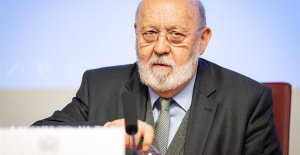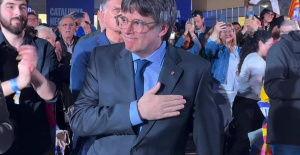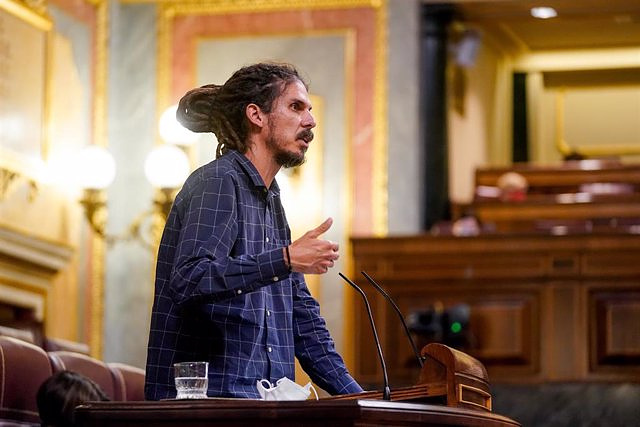Annuls the prison sentence and disqualification and maintains only the fine already paid
The Constitutional Court (TC) has upheld the appeal for protection presented by former Unidas Podemos deputy Alberto Rodríguez against the sentence imposed on him by the Supreme Court (TS) for kicking a police officer during a demonstration that took place in 2014 in La Laguna (Tenerife), thus amending the high court, considering that it imposed a "disproportionate sacrifice" on the former 'purple' leader because he lost the seat.
According to the legal sources consulted by Europa Press, this has been agreed by the Plenary with the support of the progressive majority - 7 magistrates against 4 -, although the progressive magistrate Ramón Sáez has cast a concurrent vote. For their part, the other four magistrates, framed in the conservative wing, have announced a private vote.
The court of guarantees has thus accepted the second presentation written by the progressive magistrate María Luisa Segoviano on the protection requested by Rodríguez against the ruling of the TS when she understands that during the judicial process her fundamental rights were violated.
The TS sentenced Rodríguez to a prison sentence of 1 month and 15 days as the perpetrator of a crime of attacking a law enforcement agent with the accessory penalty of special disqualification for the right to stand for election during the time of the sentence.
The high court replaced the prison sentence with a fine of 540 euros, although it clarified that this replacement of the main sentence did not affect the accessory sentence, which was what ultimately led to Rodríguez losing his seat in the Congress of the Deputies.
In a first presentation, which was analyzed last October, Segoviano proposed protecting Rodríguez, arguing that the consequences of the sentence handed down by the Supreme Court were disproportionate because they caused the former 'purple' leader to leave the Lower House.
The progressive majority of the TC agreed with Segoviano on the need to protect Rodríguez, but not on the reasons, which is why the former president of the Social Chamber of the TS decided to withdraw her text to adjust it to the majority criteria.
Thus, to this new Plenary Session he has brought a second presentation - the one finally approved - where he maintains his proposal to protect Rodríguez with a different reasoning. Specifically, it states that the legal operation carried out by the Supreme Court was incorrect because by replacing the prison sentence with a fine it was no longer possible to maintain the accessory penalty, that is, disqualification.
"DISPROPORTIONATE SACRIFICE"
As reported by the TC, the approved sentence states that, given that the criminal regulations are not "unequivocal" when determining whether accessory penalties can survive the main ones when they must be replaced by lighter ones, such as a fine, We are facing a "controversial interpretation" that in the case of Rodríguez has given rise to an "unforeseeable interpretation."
And this unforeseeable nature, he continues, is contrary to article 25 of the Constitution, according to which "no one can be convicted for actions or omissions that do not constitute a crime at the time of their occurrence."
For the TC, by maintaining disqualification as an accessory penalty, the Supreme Court departed from the constitutional principle of proportionality "because it implies a disproportionate sacrifice that produces a patently useless waste of coercion."
However, it annuls the prison sentence and disqualification and leaves only the fine, although without practical consequences, since the fine has already been paid, the disqualification was fulfilled and the legislature for which Rodríguez was elected deputy concluded.
SUPPORTS THE REST OF THE SENTENCE
The Constitutional Court analyzes the rest of Rodríguez's appeal, rejecting the other allegations, which involved denouncing violations of the rights to judicial impartiality, the presumption of innocence and assembly.
The former Podemos deputy argued that he had not enjoyed an impartial court because the TS said in the ruling that his last word, in which he announced that he would go to the TC and the European Court of Human Rights (ECHR), was inappropriate because it was evident that judicial resolutions can be challenged. However, the Constitutional Court believes that said response "does not prove an alleged enmity of the judicial body" towards Rodríguez.
He also argued that his presumption of innocence had been violated because there was not enough evidence to convict him. Regarding this, the magistrates recall that "his authorship was considered proven based on the victim's statement, with special emphasis on the corroborating elements of his credibility, also giving a complete and reasonable response to the exculpatory arguments presented by the defense." ".
Finally, he maintained that the right to assembly had been violated, although the TC establishes that, "due to the violent means used and because it was part of a dynamic of use of physical attacks on police officers by some of the participants in the concentration ", Rodríguez's conduct "cannot be framed within the scope of protection of this right, since only peaceful meetings are guaranteed by the fundamental right."
PRIVATE VOTE
For their part, conservative judges Ricardo Enríquez, Enrique Arnaldo, Concepción Espejel and César Tolosa have issued a joint dissenting opinion in which they defend that the Constitutional Court should have rejected Rodríguez's appeal.
In his opinion, "the majority ruling improperly reconstructs the request for protection" because the former 'purple' leader "did not raise at any time (...) the disproportionality of the penalty of disqualification from exercising the right to vote." passive, during the time of serving the sentence (1 month and 15 days), which is what is examined and gives rise to the estimation of the "protection" claim.
Furthermore, they maintain that "it is not sustainable (...) that it is considered 'a patent useless waste of coercion' that for committing a crime against public order a penalty is imposed that involves preventing the appellant, for 1 month and 15 days, from , could present himself as a candidate in potential elections that did not exist.
"Especially when that penalty was imposed well below the legal minimum, without the harmfulness of the punishable conduct having been mitigated by the circumstance of undue delays that does not affect the seriousness of the crime," they add.
For these four magistrates, "the sentence, in order to assess the disproportionality of the sentence, does not take into consideration either the reason for the mitigation of the sentence, nor the circumstance that elections were not called during the period of disqualification, nor the purpose of replacing the prison sentence, which does not operate in relation to accessory penalties".
Finally, they highlight that "it is the first time that a ruling from the Constitutional Court modifies the sentence that must be imposed on a convicted person, considering that the penalty imposed is a fine and not imprisonment", something that they advance that "will have effects " in Rodríguez's second appeal.
ANOTHER PENDING ISSUE
The former parliamentarian also challenged the agreement adopted on October 22, 2021 by the president of the Lower House, Meritxell Batet, to withdraw his seat after the Supreme Court condemned him. However, the TC has not now entered into this matter, which remains pending.
In addition, the former 'purple' deputy has been waiting since January 2022 for the TC to respond to a precautionary measure, with which he sought to have his deputy record returned, which he raised at the same time that he requested protection from the Constitutional Court.
It should be remembered that the Prosecutor's Office of the Constitutional Court supported protecting the Canary Islands politician for the withdrawal of the seat, but not in the challenge against the ruling of the high court.

 Exploring Cardano: Inner Workings and Advantages of this Cryptocurrency
Exploring Cardano: Inner Workings and Advantages of this Cryptocurrency Seville.- Economy.- Innova.- STSA inaugurates its new painting and sealing hangar in San Pablo, for 18 million
Seville.- Economy.- Innova.- STSA inaugurates its new painting and sealing hangar in San Pablo, for 18 million Innova.- More than 300 volunteers join the Andalucía Compromiso Digital network in one month to facilitate access to ICT
Innova.- More than 300 volunteers join the Andalucía Compromiso Digital network in one month to facilitate access to ICT Innova.-AMP.- Ayesa acquires 51% of Sadiel, which will create new technological engineering products and expand markets
Innova.-AMP.- Ayesa acquires 51% of Sadiel, which will create new technological engineering products and expand markets The PP sees the concentration of support for Sánchez in Ferraz as a "failure" and believes that it "complicates" the story of its continuity
The PP sees the concentration of support for Sánchez in Ferraz as a "failure" and believes that it "complicates" the story of its continuity Marc Márquez returns to pole in Jerez
Marc Márquez returns to pole in Jerez The CIS carries out a quick survey on Sánchez's letter to measure the reaction of citizens
The CIS carries out a quick survey on Sánchez's letter to measure the reaction of citizens 12M.- Puigdemont to Sánchez and Illa: "This is not about the future of the PSOE! What have you believed?"
12M.- Puigdemont to Sánchez and Illa: "This is not about the future of the PSOE! What have you believed?" How Blockchain in being used to shape the future
How Blockchain in being used to shape the future Not just BTC and ETH: Here Are Some More Interesting Coins Worth Focusing on
Not just BTC and ETH: Here Are Some More Interesting Coins Worth Focusing on UPV students build a prototype of a wooden house to move to Equatorial Guinea
UPV students build a prototype of a wooden house to move to Equatorial Guinea The UA opens the call for the Impulso 2024 Awards for the best innovative business initiatives
The UA opens the call for the Impulso 2024 Awards for the best innovative business initiatives ALI, virtual assistant from Alicante, internationally recognized by the OECD
ALI, virtual assistant from Alicante, internationally recognized by the OECD Retrópolis brings the golden age of video games and computing to the UPV
Retrópolis brings the golden age of video games and computing to the UPV A million people demonstrate in France against Macron's pension reform
A million people demonstrate in France against Macron's pension reform Russia launches several missiles against "critical infrastructure" in the city of Zaporizhia
Russia launches several missiles against "critical infrastructure" in the city of Zaporizhia A "procession" remembers the dead of the Calabria shipwreck as bodies continue to wash up on the shore
A "procession" remembers the dead of the Calabria shipwreck as bodies continue to wash up on the shore Prison sentences handed down for three prominent Hong Kong pro-democracy activists
Prison sentences handed down for three prominent Hong Kong pro-democracy activists ETH continues to leave trading platforms, Ethereum balance on exchanges lowest in 3 years
ETH continues to leave trading platforms, Ethereum balance on exchanges lowest in 3 years Investors invest $450 million in Consensys, Ethereum incubator now valued at $7 billion
Investors invest $450 million in Consensys, Ethereum incubator now valued at $7 billion Alchemy Integrates Ethereum L2 Product Starknet to Enhance Web3 Scalability at a Price 100x Lower Than L1 Fees
Alchemy Integrates Ethereum L2 Product Starknet to Enhance Web3 Scalability at a Price 100x Lower Than L1 Fees Mining Report: Bitcoin's Electricity Consumption Declines by 25% in Q1 2022
Mining Report: Bitcoin's Electricity Consumption Declines by 25% in Q1 2022 Oil-to-Bitcoin Mining Firm Crusoe Energy Systems Raised $505 Million
Oil-to-Bitcoin Mining Firm Crusoe Energy Systems Raised $505 Million Microbt reveals the latest Bitcoin mining rigs -- Machines produce up to 126 TH/s with custom 5nm chip design
Microbt reveals the latest Bitcoin mining rigs -- Machines produce up to 126 TH/s with custom 5nm chip design Bitcoin's Mining Difficulty Hits a Lifetime High, With More Than 90% of BTC Supply Issued
Bitcoin's Mining Difficulty Hits a Lifetime High, With More Than 90% of BTC Supply Issued The Biggest Movers are Near, EOS, and RUNE during Friday's Selloff
The Biggest Movers are Near, EOS, and RUNE during Friday's Selloff Global Markets Spooked by a Hawkish Fed and Covid, Stocks and Crypto Gain After Musk Buys Twitter
Global Markets Spooked by a Hawkish Fed and Covid, Stocks and Crypto Gain After Musk Buys Twitter Bitso to offset carbon emissions from the Trading Platform's ERC20, ETH, and BTC Transactions
Bitso to offset carbon emissions from the Trading Platform's ERC20, ETH, and BTC Transactions Draftkings Announces 2022 College Hoops NFT Selection for March Madness
Draftkings Announces 2022 College Hoops NFT Selection for March Madness























